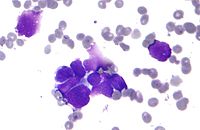
Photo from wikipedia
Hepatocellular carcinoma (HCC) is the third leading cause of cancer-related death and is associated with a dismal median survival of 2–9 months. The fundamental limitations and ineffectiveness of current HCC… Click to show full abstract
Hepatocellular carcinoma (HCC) is the third leading cause of cancer-related death and is associated with a dismal median survival of 2–9 months. The fundamental limitations and ineffectiveness of current HCC treatments have led to the development of a vast range of nanotechnologies with the goal of improving the safety and efficacy of treatment for HCC. Although remarkable success has been achieved in nanomedicine research, there are unique considerations such as molecular heterogeneity and concomitant liver dysfunction that complicate the translation of nanotheranostics in HCC. This review highlights the progress, challenges, and targeting opportunities in HCC nanomedicine based on the growing literature in recent years.
Journal Title: Pharmaceutics
Year Published: 2021
Link to full text (if available)
Share on Social Media: Sign Up to like & get
recommendations!